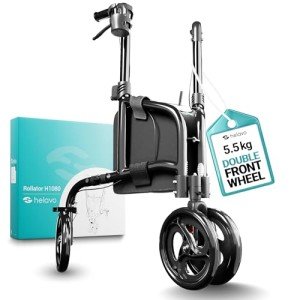The Importance of High-Quality Walkers: An In-Depth Guide
When mobility becomes a challenge, having reliable support is vital for maintaining independence and enhancing lifestyle. In this context, high-quality walkers emerge as important tools for people with restricted mobility. This post will explore the attributes, benefits, and suggestions for high-quality walkers, together with an extensive FAQ section.
What is a Walker?
Walkers are mobility help created to support individuals who have problem walking unaided. They supply stability and balance, lowering the danger of falls and allowing users to navigate their environment more confidently. Safe Walker -quality walkers are especially crucial for elderly individuals and those recovering from surgery or injury.
Characteristics of High-Quality Walkers
When selecting a walker, it is important to consider various attributes that determine quality. Below are some vital qualities of high-quality walkers.
| Characteristic | Description |
|---|---|
| Products | High-quality walkers are normally made from durable products like aluminum or steel, supplying robust support without being excessively heavyweight. |
| Adjustability | The height of the walker must be adjustable to fit the user's specific needs. An excellent walker permits users to stand easily without flexing. |
| Weight Capacity | High-quality walkers have a defined weight limitation. Picking a walker that conveniently supports the user's weight is key for security. |
| Wheels | Walkers geared up with wheels boost maneuverability. A two-wheeled walker is easier to press, while four-wheeled styles can enhance stability. |
| Grip and Handles | Ergonomically created grips reduce stress on the hands. They need to provide a comfortable and secure hold. |
| Accessories | Some walkers include extra features like trays, baskets, and storage choices, improving benefit for day-to-day tasks. |
| Foldability | High-quality walkers typically include a foldable design, making them easier to transport and save. |
Benefits of High-Quality Walkers
Investing in a high-quality walker offers numerous benefits that significantly affect a user's life:
Enhanced Stability and Support
High-quality walkers offer essential support, making it possible for users to preserve balance and stability. This is particularly vital for older grownups or those recuperating from health problem or injury.
Enhanced Mobility
A great walker allows users to move around more easily, promoting self-reliance in daily activities such as shopping, dining, or socializing. This enhanced mobility can contribute favorably to psychological health and total wellness.
Personalization for Individual Needs
High-quality walkers often enable users to pick features that cater specifically to their needs, such as adjustable heights, integrated seats, and extra storage. This customization assists users feel more comfortable and secure.
Security Features
Lots of high-quality walkers come with security features such as locking systems on wheels and hand brakes. These features permit much safer navigation, particularly on inclines or when browsing irregular surfaces.
Toughness
Purchasing a high-quality walker normally implies less regular replacements and repair work. High-quality materials and building lead to lasting items that can endure daily wear and tear.
Types of Walkers
While lots of walkers serve the same purpose, they can be found in numerous types to suit various needs. Here's a list of the most common kinds of walkers readily available:
- Standard Walkers: Basic designs with four legs and no wheels; provide maximum stability.
- Two-Wheel Walkers: Include front wheels for much easier motion while maintaining support.
- Four-Wheel Rollators: Feature four wheels, hand brakes, and a seat; perfect for those who need additional support and like to rest while on the go.
- Hemi Walkers: Designed for one-handed usage, typically utilized by people who have restricted usage of one arm.
- Bariatric Walkers: Reinforced walkers developed to support much heavier weights comfortably.
- Seated Walkers: Combine walking support with an integrated seat, enabling users to take breaks during strolls.
Contrast Table of Walker Types
| Walker Type | Stability | Mobility | Seat Available | Weight Limit |
|---|---|---|---|---|
| Basic | High | Low | No | 250 lbs |
| Two-Wheel | Medium | Medium | No | 300 pounds |
| Four-Wheel | Medium | High | Yes | 350 lbs |
| Hemi | High | Low | No | 250 lbs |
| Bariatric | High | Medium | No | 500 lbs |
| Seated | Medium | High | Yes | 300 lbs |
Frequently asked question Section
Q1: How do I choose the best walker for my requirements?
Picking the best walker involves considering aspects such as your mobility needs, weight capability, height, and specific features that might be helpful (e.g., wheels, seat).
Q2: Are walkers easy to use?
Yes, a lot of walkers are developed for ease of usage. However, some people might require a long time to change. Correct education on usage can improve availability.
Q3: How should I preserve my walker?
Regularly check the walker for any signs of wear and tear. Guarantee all parts operate appropriately, tighten loose screws, and clean it occasionally to prevent build-up of dirt.
Q4: Can I use a walker for long distances?
Some walkers, especially four-wheeled rollators, are created for longer ranges and come geared up with features like comfortable seats and storage options.
Q5: Do I require a prescription for a walker?
Most of the times, a walker can be purchased without a prescription. Nevertheless, for insurance coverage or particular requirements, seek advice from a health care service provider.
High-quality walkers function as indispensable help for individuals facing mobility challenges, supplying support, enhancing independence, and making sure safety. Choosing the ideal walker includes comprehending one's specific requirements and considering various aspects, including products, adjustability, and type. By purchasing a high-quality walker, individuals can navigate their environments with self-confidence and ease, enhancing their quality of life substantially.

